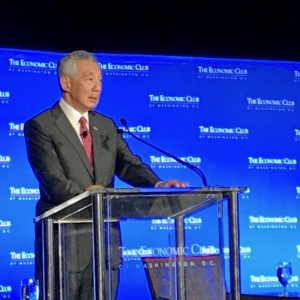Singaporean Prime Minister Lee Hsien Loong on Monday during a state visit to Washington D.C. expressed disappointment in the United States’ withdrawal from the Trans-Pacific Partnership, saying that, “(Asia) is really your game to lose. Don’t lose it.”
However, later in the day at the White House, Singapore and the U.S. re-affirmed their long held ties with a Boeing aircraft deal worth almost $14 billion and agreed on their shared goal of denuclearizing North Korea.
Lee is in Washington this week on a working visit at the invitation of President Donald Trump. Trump is the third U.S. President that Lee has met. He also recently met with former President Barack Obama last year at the White House to celebrate the 50th anniversary of diplomatic ties between the two countries.
Speaking at the Economic Club of Washington D.C., Lee said that he believed the U.S. stood to gain from an interdependent world with open exchanges and multilateral rules. Furthermore, he argued that U.S.-China relations will define war and peace not just in Asia, but the world.
There is a raging debate occurring within American politics right now that pits “Globalism vs Nationalism,” in this battle it appears clear that Lee would take the side of the globalists.
“I know you are preoccupied with domestic matters and every country has its own domestic issues to handle. But the external world is moving, Asia is dynamic and America … you not only have a role to play, it’s really your game to lose. Don’t lose it,” Lee said at the Economic Club event.
Despite Trump withdrawing from the TPP, Lee said the remaining countries planned to go ahead with the trade pact, in a re-engineered form. He also expressed his hope that the U.S. will continue to maintain and grow its economic ties with Asian countries in other ways.
While now is “not the time to start major new trade initiatives,” Lee said the “U.S. should still uphold free trade and tackle trade issues that arise cooperatively with partners.”
Furthermore he stated that in Singapore and around Asia “there are investment and technological gaps American companies can fill. There are also growing middle classes to purchase innovative and high quality U.S. products.”
The prime minister acknowledged that although the hype about an “Asian Century” has cooled somewhat, many Asian economies are still among the fastest growing, and make up two-thirds of global growth today.
Chinese companies like Alibaba and Huawei, or Indian companies like Bharti Enterprises and the Mahindra Group, are world class multi-national corporations, Lee added.
The deal struck at the White House today was between two of the largest American and Singaporean corporations — Singapore Airlines agreed to buy 39 airplanes worth close to $14 billion from American aircraft manufacturer Boeing. Trump said the deal would create some 70,000 American jobs.
Despite being an island nation of only 5.6 million people, Singapore is the second largest Asian investor in the U.S., with over $70 billion in stock investments. Total trade in goods and services amounted to more than $68 billion last year, and Singapore is one of the few countries where the U.S. has consistently run a trade surplus, which stood at over $18 billion in 2016.
The U.S. also exports $43 billion a year in goods and services to Singapore. This translates to every Singaporean buying approximately $7,500 worth of American goods and services every year – from electronics to medical products, to financial and consultancy services, to tires and golf clubs.
Lee noted at the White House that he, too, recently found out that his New Balance shoes were made in the U.S., probably in New England.
On the security front, Singapore and the U.S. signed a joint enhanced Defense Cooperation Agreement in 2015 that created a foundation for a stronger defense relationship.
Singapore is also the only Asian country to have contributed both military assets and personnel to the U.S.-led coalition to defeat the Islamic State right from the beginning, which Lee pointed out at the White House. Singapore will extend its existing deployment of armed forces to next year.
Regarding North Korea and the two countries’ attempts to create stability in the region, the prime minister said at the White House that “there is no quick and easy solution” to the denuclearization of the Korean peninsula and highlighted the significance of the United States’ international cooperation in isolating the North Korean regime.
“There is no quick and easy solution… Pressure is necessary, but so is dialogue. The U.S. will need to work with others including China, South Korea, Japan, and Russia to resolve the issue,” said Lee.
He stressed that Singapore has already taken steps to isolate North Korea and said that “defense ties are very strong” currently between the U.S. and Singapore.

